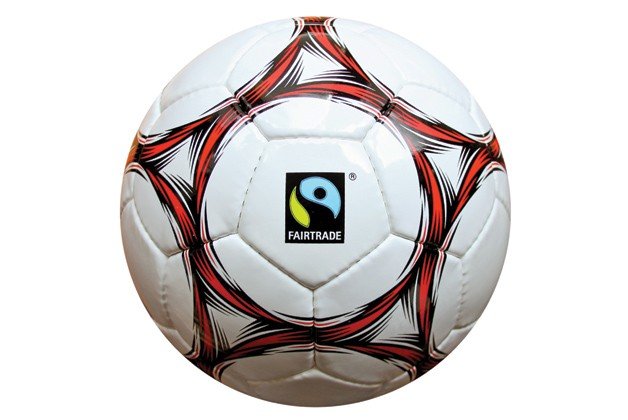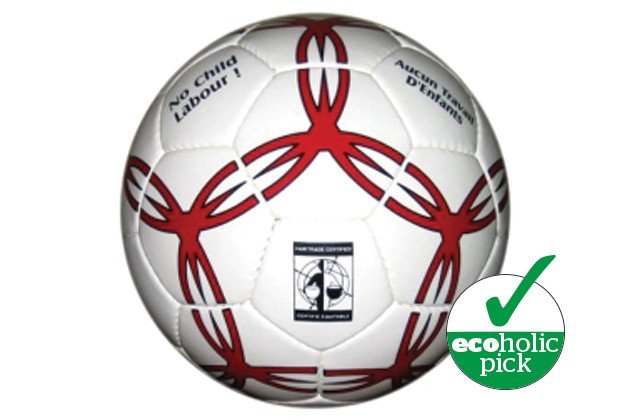
DIADORA
Like most major soccer ball makers, this Italian brand offers up cheaper balls of ecologically benched PVC and pricier one made of somewhat less red-flagged polyurethane. Rank A Brand, Europe’s largest brand-ranking site for sustainability and labour rights, is not impressed with Diadora, kicking the company its lowest score for “communicating nothing concrete” about its enviro and labour policies. A 2012 Dutch NGO report found Diadora sourcing materials from some pretty exploitative factories in India.
SCORE: N

NIKE
We first learned about the shadowy world of children stitching soccer balls when a picture of a 12-year-old Pakistani boy hand-sewing one for Nike surfaced in Life Magazine in 1996. That’s when Nike, Adidas, Puma and others started working with the International Labour Organization to eradicate child labour in Pakistan’s soccer ball industry. Nike has made a lot of improvements, but as with most sports equipment giants, labour rights violations persist, despite decent headway on the sustainability front.
SCORE: NN

ADIDAS
Sweatshop claims have dogged Adidas balls and jerseys at multiple World Cups past, but this year the company’s actually letting news crews into its modern factory in Pakistan to see for themselves how official World Cup Brazuca balls are made. Workers there make $100 a month (the legal minimum wage) and supposedly work no more than eight-hour days, six days a week. An improvement, but nowhere near fair trade. Adidas gets kudos for its sustainability efforts, including committing to detox its factories, but like Nike scores a C at Rank A Brand.
SCORE: NN

SOCIAL CONSCIENCE
Aah, finally, a ball you can feel good about. These guys are PVC-free and all come from fair trade suppliers in Pakistan. That means manufacturing has to meet stringent social, economic and even some environmental standards. Social Conscience makes both match-quality and kids’ balls with polyurethane exteriors. The company makes volleyballs and basketballs, too. Kids’ balls available at Ten Thousand Villages otherwise, head to social-conscience.com.
SCORE: NNNN

Y FOCUS
Goal! Another Fair Trade-certified soccer ball you can kick around with a clear conscience. These are also PVC-free and made of polyurethane but with all natural latex bladders certified by the Forest Stewardship Council. So far Y Focus contributions to fair trade funds have helped build a community health centre and more. You can score them at Y Focus retailers (yfocus.ncf.ca/fairtrade) or at buygreenonline.ca. Pro, match and youth quality options as well as volleyball, football, basketball and rugby balls.
SCORE: NNNN
nature notes

CUT THE CHEESE:
CALLS FOR SAPUTO BOYCOTT MOUNT
Before you toss some bocconcini into a salad or sprinkle mozza’ on a pizza, you might want to have a seat. Video footage of vicious animal abuses at Canada’s largest dairy farm have prompted growing calls for a boycott of one of the nation’s biggest cheese brands.
Earlier this month, Mercy for Animals Canada released undercover video of employees at BC’s Chilliwack Cattle Sales Ltd “using chains, canes, rakes, their booted feet and their fists to viciously whip, punch, kick and beat the dairy cows, including downed and trapped cows who could not escape the abuse,” according to BC SPCA’s chief prevention and enforcement officer. The SPCA is calling for Criminal Code charges against eight employees whom Chilliwack has since fired.
Animal welfare activists, however, say it’s time brands using Chilliwack products be held accountable as well.
A campaign is rapidly building against one in particular, Saputo Dairy Products, Canada’s largest milk purchaser. Mercy for Animals’ petition at Change.org is calling on Saputo to adopt meaningful animal welfare policies for all its dairy suppliers, including zero tolerance for animal abuse, proper care for sick, injured or downed animals and video monitoring of facilities live-streamed onto the net. So far, over 100,000 people have signed on.
Saputo says it’s “outraged” by the footage but initially said it has no control over where it gets its milk, since it’s purchased through BC’s centralized milk marketing board, which pools the province’s milk before distributing it. Saputo has since said it will not accept milk from the board that comes from the Chilliwack farm until its animal welfare practices are beefed up. See mercyforanimals.ca.
BRAZIL’S RAINFORESTS BACK FROM THE BRINK?
Despite riots in urban Brazil, good news has emerged from the nation’s sprawling jungles. The country once notorious for clear-cutting its rainforest to make way for McDonald’s beef has slashed its deforestation rate by 70 per cent since 2005.
According to a new report from the Union of Concerned Scientists, keeping those carbon-sequestering forests intact has been a major factor behind the country’s plummeting greenhouse gas emissions, which are falling faster than any other nation’s. And while beef and soy production has continued to expand at a rapid clip, it’s pretty much all been done on already cleared land, thanks in part to moratoria on deforestation. Imagine that – growing an industry without trashing green space. There’s a clear-cut lesson in there for Canada’s tar sands.
greenwash of the week

VEET NATURAL INSPIRATIONS
Ladies, gents, anyone waxing various body parts, listen in. I’m a huge supporter of forgoing petroleum-based paraffin waxing in favour of centuries-old wax alternatives like sugaring. In honour of Brazil’s World Cup, you can even brave a Brazilian done this way at spots like Sugar Moon. Sugaring’s growing in popularity, and it’s nice to see Veet, the classic chemical-intensive hair removal brand, offering up some more natural alternatives. Its basic sugar strips are 99 per cent naturally derived, but the rest of its line is hit-and-miss and often definitely more “naturally inspired” than natural. The wax strips, wipes and creams are loaded with petrochemicals and big on mineral oil, which is just another petroleum-derived ingredient like the paraffin in run-of-the mill waxing products. Not exactly a green or natural way to tear a strip off.
ecoholic@nowtoronto.com | @ecoholicnation












